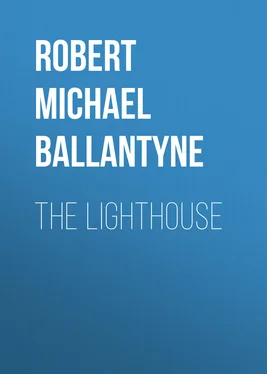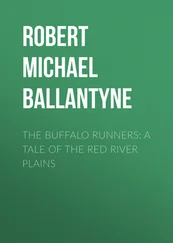Robert Michael Ballantyne - The Lighthouse
Здесь есть возможность читать онлайн «Robert Michael Ballantyne - The Lighthouse» — ознакомительный отрывок электронной книги совершенно бесплатно, а после прочтения отрывка купить полную версию. В некоторых случаях можно слушать аудио, скачать через торрент в формате fb2 и присутствует краткое содержание. Жанр: Детские приключения, literature_19, foreign_antique, foreign_prose, foreign_children, на английском языке. Описание произведения, (предисловие) а так же отзывы посетителей доступны на портале библиотеки ЛибКат.
- Название:The Lighthouse
- Автор:
- Жанр:
- Год:неизвестен
- ISBN:нет данных
- Рейтинг книги:4 / 5. Голосов: 1
-
Избранное:Добавить в избранное
- Отзывы:
-
Ваша оценка:
- 80
- 1
- 2
- 3
- 4
- 5
The Lighthouse: краткое содержание, описание и аннотация
Предлагаем к чтению аннотацию, описание, краткое содержание или предисловие (зависит от того, что написал сам автор книги «The Lighthouse»). Если вы не нашли необходимую информацию о книге — напишите в комментариях, мы постараемся отыскать её.
The Lighthouse — читать онлайн ознакомительный отрывок
Ниже представлен текст книги, разбитый по страницам. Система сохранения места последней прочитанной страницы, позволяет с удобством читать онлайн бесплатно книгу «The Lighthouse», без необходимости каждый раз заново искать на чём Вы остановились. Поставьте закладку, и сможете в любой момент перейти на страницу, на которой закончили чтение.
Интервал:
Закладка:
We will not, therefore, detain the reader by telling him of all the preliminary difficulties that were encountered and overcome in this “Robinson Crusoe” sort of work; how that a temporary floating lightship, named the Pharos , was prepared and anchored in the vicinity of the rock in order to be a sort of depot and rendezvous and guide to the three smaller vessels employed in the work, as well as a light to shipping generally, and a building-yard was established at Arbroath, where every single stone of the lighthouse was cut and nicely fitted before being conveyed to the rock. Neither shall we tell of the difficulties that arose in the matter of getting blocks of granite large enough for such masonry, and lime of a nature strong enough to withstand the action of the salt sea. All this, and a great deal more of a deeply interesting nature, must remain untold, and be left entirely to the reader’s imagination. 1 1 It may be found, however, in minute detail, in the large and interesting work entitled Stevenson’s Bell Rock Lighthouse .
Suffice it to say that the work was fairly begun in the month of August, 1807; that a strong beacon of timber was built, which was so well constructed that it stood out all the storms that beat against it during the whole time of the building operations; that close to this beacon the pit or foundation of the lighthouse was cut down deep into the solid rock; that the men employed could work only between two and three hours at a time, and had to pump the water out of this pit each tide before they could resume operations; that the work could only be done in the summer months, and when engaged in it the men dwelt either in the Pharos floating light, or in one of the attending vessels, and were not allowed to go ashore—that is, to the mainland, about twelve miles distant; that the work was hard, but so novel and exciting that the artificers at last became quite enamoured of it, and that ere long operations were going busily forward, and the work was in a prosperous and satisfactory state of advancement.
Things were in this condition at the Bell Rock, when, one fine summer evening, our friend and hero, Ruby Brand, returned, after a long absence, to his native town.
Chapter Six
The Captain Changes His Quarters
It was fortunate for Ruby that the skipper of the vessel ordered him to remain in charge while he went ashore, because he would certainly have been recognised by numerous friends, and his arrival would speedily have reached the ears of the officers of justice, who seem to be a class of men specially gifted with the faculty of never forgetting. It was not until darkness had begun to settle down on the town that the skipper returned on board, and gave him leave to go ashore.
Ruby did not return in the little coaster in which he had left his native place. That vessel had been wrecked not long after he joined her, but the crew were saved, and Ruby succeeded in obtaining a berth as second mate of a large ship trading between Hull and the Baltic. Returning from one of his voyages with a pretty good sum of money in his pocket, he resolved to visit his mother and give it to her. He therefore went aboard an Arbroath schooner, and offered to work his passage as an extra hand. Remembering his former troubles in connexion with the press-gang, he resolved to conceal his name from the captain and crew, who chanced to be all strangers to him.
It must not be supposed that Mrs Brand had not heard of Ruby since he left her. On the contrary, both she and Minnie Gray got letters as frequently as the postal arrangements of those days would admit of; and from time to time they received remittances of money, which enabled them to live in comparative comfort. It happened, however, that the last of these remittances had been lost, so that Mrs Brand had to depend for subsistence on Minnie’s exertions, and on her brother’s liberality. The brother’s power was limited, however, and Minnie had been ailing for some time past, in consequence of her close application to work, so that she could not earn as much as usual. Hence it fell out that at this particular time the widow found herself in greater pecuniary difficulties than she had ever been in before.
Ruby was somewhat of an original. It is probable that every hero is. He resolved to surprise his mother by pouring the money he had brought into her lap, and for this purpose had, while in Hull, converted all his savings into copper, silver, and gold. Those precious metals he stowed separately into the pockets of his huge pea-jacket, and, thus heavily laden, went ashore about dark, as soon as the skipper returned.
At this precise hour it happened that Mrs Brand, Minnie Gray, and Captain Ogilvy were seated at their supper in the kitchen of the cottage.
Two days previously the captain had called, and said to Mrs Brand—
“I tell ’ee what it is, sister, I’m tired of livin’ a solitary bachelor life, all by myself, so I’m goin’ to make a change, lass.”
Mrs Brand was for some moments speechless, and Minnie, who was sewing near the window, dropped her hands and work on her lap, and looked up with inexpressible amazement in her sweet blue eyes.
“Brother,” said Mrs Brand earnestly, “you don’t mean to tell me that you’re going to marry at your time of life?”
“Eh! what? Marry?”
The captain looked, if possible, more amazed than his sister for a second or two, then his red face relaxed into a broad grin, and he sat down on a chair and chuckled, wiping the perspiration (he seemed always more or less in a state of perspiration) from his bald head the while.
“Why, no, sister, I’m not going to marry; did I speak of marryin’?”
“No; but you spoke of being tired of a bachelor life, and wishing to change.”
“Ah! you women,” said the captain, shaking his head—“always suspecting that we poor men are wantin’ to marry you. Well, pr’aps you ain’t far wrong neither; but I’m not goin’ to be spliced yet-a-while, lass. Marry, indeed!
“‘Shall I, wastin’ in despair,
Die, ’cause why? a woman’s rare?’”
“Oh! Captain Ogilvy, that’s not rightly quoted,” cried Minnie, with a merry laugh.
“Ain’t it?” said the captain, somewhat put out; for he did not like to have his powers of memory doubted.
“No; surely women are not rare ,” said Minnie.
“Good ones are,” said the captain stoutly.
“Well; but that’s not the right word.”
“What is the right word, then?” asked the captain with affected sternness, for, although by nature disinclined to admit that he could be wrong, he had no objection to be put right by Minnie.
“Die because a woman’s f—,” said Minnie, prompting him.
“F—, ‘funny?’” guessed the captain.
“No; it’s not ‘funny,’” cried Minnie, laughing heartily.
“Of course not,” assented the captain, “it could not be ‘funny’ nohow, because ‘funny’ don’t rhyme with ‘despair;’ besides, lots o’ women ain’t funny a bit, an’ if they was, that’s no reason why a man should die for ’em; what is the word, lass?”
“What am I ?” asked Minnie, with an arch smile, as she passed her fingers through the clustering masses of her beautiful hair.
“An angel, beyond all doubt,” said the gallant captain, with a burst of sincerity which caused Minnie to blush and then to laugh.
“You’re incorrigible, captain, and you are so stupid that it’s of no use trying to teach you.”
Mrs Brand—who listened to this conversation with an expression of deep anxiety on her meek face, for she could not get rid of her first idea that her brother was going to marry—here broke in with the question—
Читать дальшеИнтервал:
Закладка:
Похожие книги на «The Lighthouse»
Представляем Вашему вниманию похожие книги на «The Lighthouse» списком для выбора. Мы отобрали схожую по названию и смыслу литературу в надежде предоставить читателям больше вариантов отыскать новые, интересные, ещё непрочитанные произведения.
Обсуждение, отзывы о книге «The Lighthouse» и просто собственные мнения читателей. Оставьте ваши комментарии, напишите, что Вы думаете о произведении, его смысле или главных героях. Укажите что конкретно понравилось, а что нет, и почему Вы так считаете.












